
- Wood From Original
- Age
- Brand
- Alfa Romeo (13)
- Andy Clancy Designs (9)
- Antique (21)
- Bbh Homes (15)
- Handmade (43)
- Japanese Netsuke (19)
- Jay Bigler, Maker (8)
- King (5)
- Lexus (10)
- Mercedes-benz (104)
- Nepal Forged (6)
- Original (20)
- Table (12)
- Threea (7)
- Toyokuni (7)
- Unknown (11)
- Volkswagen (5)
- Windlass Steelcraft (7)
- Wolf Creek (5)
- Wooden (22)
- ... (3557)
- Material
- Orientation
- Shape
- Style
- Abstract (30)
- Americana (78)
- Antique (46)
- Art Deco (37)
- Asian (20)
- Black Forest (26)
- Country (22)
- Expressionism (14)
- Folk Art (60)
- French (31)
- Impressionism (24)
- Mid-century Modern (54)
- Modern (19)
- Naive, Primitive (59)
- Realism (44)
- Rustic / Primitive (14)
- Traditional (19)
- Victorian (35)
- Vintage (20)
- Wood Block Prints (40)
- ... (3214)
RARE PUNU AFRICAN TRIBAL MASK With HISTORY FROM OUR EXPERT GLASS EYES PLUS ONE
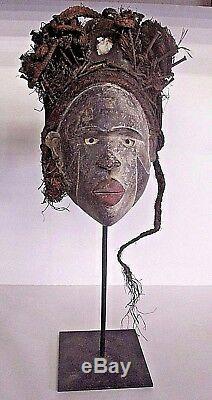
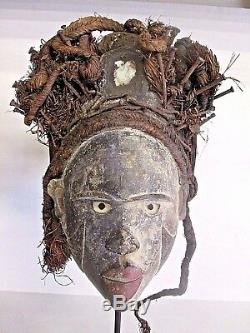
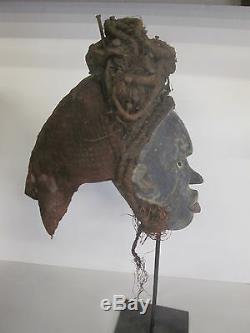
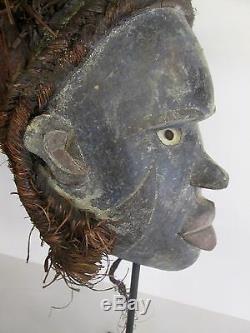
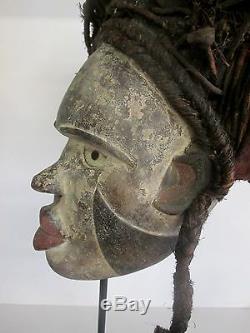
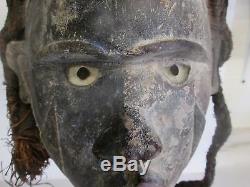

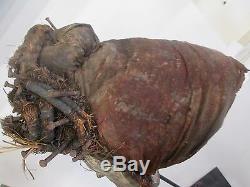
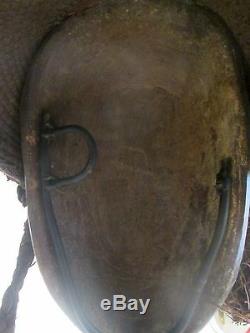





This outstanding mask was created by a master craftsman from the Punu tribe. Beautifully carved with an extremely expressive face. It caught our attention immediately along with another top notch mask from another tribe..
We acquired it from an estate of an extremely influential Cincinnatian. One of our African experts, Ali, advised that it is used to ostensibly "solve problems" when someone is bothering you i.
The IRS, an enemy, a problem causing neighbor, etc. He informed us that in his opinion the mask was actually used. According to Ali masks are usually used for a generation (70-100 years) and then discarded. This mask is carved and finished exquisitely. It is mounted on a custom made metal stand. Condition / wear is normal for the age and use. Mask: 14" high x 11" x 13.The Punu reside on the left bank of the Upper Ngoume River (Gabon) and belong to the group of tribes known as Shira which were originally part of the Luango kingdom of Angola. With the Eshira, the Lumbo, the Vili, the Galoa, and the Vungu people, the Punu migrated northwards during the 18th century and settled in the area where they continue to inhabit to this day.
They live in independent villages divided into clans and families, and social cohesion is ensured by a society known as moukouji. Its primary role is to regulate community life with regards to social and judicial matters, and mainly it applies itself to the neutralization of evil forces. To this end, officiates of moukoudji utilize a cult kit that includes statuettes, human relics and masks. Punu masks represent idealized female ancestors' faces.
The white color of the mask is genderless; white is a symbol for peace, deities, spirits of the dead, and the afterlife. It is thus the predominating color in funeral celebrations and memorials. Therefore the masks were worn during funerals. They appeared also in the magical rites whose function was to unmask sorcerers. The masks have realistic, mostly white but sometimes black faces with protruding pursed lips, globular protruding eyes incised with a curve, high-domed foreheads, and characteristic rigid high coiffures reflecting the Punu women's hair styles.
The masks often have an Oriental expression, but no such influence has been established. Many Punu masks can be recognized by raised diamond-shape scarification marks on the foreheads and temples.
The scarification marks on the temples are thought to be associated either with a female ancestor, or with a southern sub-group of the Punu tribe. Black face-masks have exactly the same stylistic characteristics as the white masks, but they are believed to have a judiciary function and help identify sorcerers. The performances of the masks are nowadays intended primarily to entertain audiences on festive occasions. Only rarely do the masqueraders fulfill a ritual function of officiating at funerals, when they dance as embodiments of the ancestor spirits. In performances the dancers, wearing costumes of raffia or cotton fabric and animal pelts, move with amazing acrobatic agility on stilts up to six and a half feet in height. The Punu also carve standing reliquary figures, which watch over the bones of the deceased. Punu artists carved also amulets and everyday objects showing faces similar to those found on masks. It is thought they were used as prestige objects, during magical ceremonies, or were kept alongside the ancestral bones in a reliquary box. Check out our sites to browse our extensive collection of outstanding fine art and antiques! Check out our 3500 Sq. Showroom in Cincinnati 45226 near EBTH.The item "RARE PUNU AFRICAN TRIBAL MASK With HISTORY FROM OUR EXPERT GLASS EYES PLUS ONE" is in sale since Sunday, March 24, 2019. This item is in the category "Antiques\Ethnographic\African\Masks".
The seller is "lookusover" and is located in Cincinnati, Ohio. This item can be shipped to United States, Canada, United Kingdom, Denmark, Romania, Slovakia, Bulgaria, Czech republic, Finland, Hungary, Latvia, Lithuania, Malta, Estonia, Australia, Greece, Portugal, Cyprus, Slovenia, Japan, China, Sweden, South Korea, Indonesia, Taiwan, Thailand, Belgium, France, Hong Kong, Ireland, Netherlands, Poland, Spain, Italy, Germany, Austria, Bahamas, Israel, Mexico, New Zealand, Philippines, Singapore, Switzerland, Norway, Saudi arabia, United arab emirates, Qatar, Kuwait, Bahrain, Croatia, Malaysia, Brazil, Chile, Costa rica, Panama, Trinidad and tobago, Guatemala, Honduras, Jamaica, Viet nam, Uruguay, Aruba, Belize, Dominica, Grenada, Saint kitts and nevis, Turks and caicos islands, Bangladesh, Bermuda, Brunei darussalam, Bolivia, Ecuador, Egypt, French guiana, Guernsey, Gibraltar, Guadeloupe, Iceland, Jersey, Jordan, Cambodia, Liechtenstein, Luxembourg, Monaco, Macao, Martinique, Maldives, Nicaragua, Peru, Pakistan, Paraguay, Reunion.
- Tribe: Punu
- Material: Wood
- Original/Reproduction: Original
- Region or Culture: African

